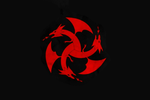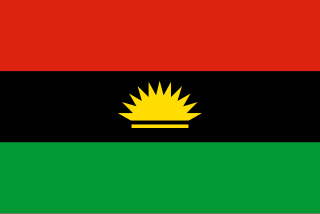
Biafra, officially the Republic of Biafra, was a partially recognised state in West Africa that declared independence from Nigeria and existed from 1967 until 1970. Its territory consisted of the former Eastern Region of Nigeria, predominantly inhabited by the Igbo ethnic group. Biafra was established on 30 May 1967 by Igbo military officer and Eastern Region governor C. Odumegwu Ojukwu under his presidency, following a series of ethnic tensions and military coups after Nigerian independence in 1960 that culminated in the 1966 anti-Igbo pogrom. The Nigerian military proceeded to attempt to reclaim the territory of Biafra, resulting in the start of the Nigerian Civil War. Biafra was formally recognised by Gabon, Haiti, Ivory Coast, Tanzania, and Zambia while receiving de facto recognition and covert military support from France, Portugal, Israel, South Africa and Rhodesia. After nearly three years of war, during which around two million Biafran civilians died, President Ojukwu fled to Ivory Coast in exile as the Nigerian military was approaching the capital of Biafra. Philip Effiong became the second president of Biafra, and he oversaw the surrender of Biafran forces to Nigeria.

The Nigerian Civil War, also known as the Nigerian–Biafran War or the Biafran War, was a civil war fought between Nigeria and the Republic of Biafra, a secessionist state which had declared its independence from Nigeria in 1967. Nigeria was led by General Yakubu Gowon, while Biafra was led by Lieutenant Colonel Chukwuemeka "Emeka" Odumegwu Ojukwu. Biafra represented the nationalist aspirations of the Igbo ethnic group, whose leadership felt they could no longer coexist with the federal government dominated by the interests of the Muslim Hausa-Fulanis of Northern Nigeria. The conflict resulted from political, economic, ethnic, cultural and religious tensions which preceded the United Kingdom's formal decolonisation of Nigeria from 1960 to 1963. Immediate causes of the war in 1966 included a military coup, a counter-coup, and anti-Igbo pogroms in Northern Nigeria.

Owerri is the capital city of Imo State in Nigeria, set in the heart of Igboland. It is also the state's largest city, followed by Orlu, Okigwe and Ohaji/Egbema. Owerri consists of three Local Government Areas including Owerri Municipal, Owerri North and Owerri West, it has an estimated population of about 1,401,873 as of 2016 and is approximately 100 square kilometres (40 sq mi) in area. Owerri is bordered by the Otamiri River to the east and the Nworie River to the south. The Owerri Slogan is Heartland.
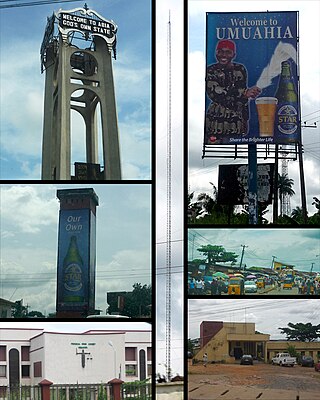
Umuahia is the capital city of Abia State in southeastern Nigeria. Umuahia is located along the rail road that lies between Port Harcourt to its south,and Enugu city to its north. Umuahia has a population of 359,230 according to the 2006 Nigerian census. Umuahia is indigenously Igbo.

The flag of Biafra, used by the Republic of Biafra during the Nigerian Civil War (1967–1970), consists of a horizontal tricolour of red, black, and green, charged with a golden rising sun over a golden bar. The eleven rays of the sun represent the eleven former provinces of Biafra. The rays are typically long and slender with the lowest rays being nearly horizontal and the remaining rays spread evenly between.
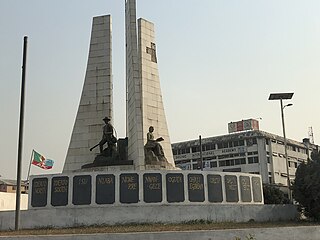
Imo State is a state in the South-East geopolitical zone of Nigeria, bordered to the north by Anambra State, Rivers State to the west and south, and Abia State to the east. It takes its name from the Imo River which flows along the state's eastern border. The state capital is Owerri and the state nickname is the "Eastern Heartland."
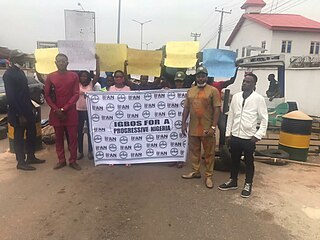
Anti-Igbo sentiment encompasses a range of negative attitudes and feelings towards the Igbo people. The Igbo people make up all of south-eastern Nigeria and a part of south-south Nigeria's geopolitical zones. Igbophobia is observable in critical and hostile behaviour such as political and religious discrimination and violence towards Igbos.
Amaifeke is an urban town in Orlu Local Government Area LGA of Imo State in the Niger Delta region of South Eastern Nigeria. The town shares the Orlu Urban metropolis area with Umuna and part of Orlu village. The indigenous population of Amaifeke belong to the Igbo ethnic group and the town is situated within the Igbo cultural area. Amaifeke shares boundaries with the following towns; Ihioma, Okporo, Okwuabala, Umuna, Orlu and Owere Ebeiri. The main language spoken in Amaifeke is the Orsu variant of the Igbo language.

Nnamdi Okwu Kanu is a British-Nigerian political activist who advocates for the secession and independence of Biafra from Nigeria. He is the leader of the Indigenous People of Biafra (IPOB), which he founded in 2014. The main aim of IPOB is to restore the defunct separatist state of Biafra which existed in Nigeria's Eastern Region during the Nigerian Civil War of 1967–1970.

The Indigenous People of Biafra (IPOB) is a separatist group in Nigeria that aims to restore the defunct Republic of Biafra, a country which seceded from Nigeria prior to the Nigerian Civil War (1967–1970). Since 2021, IPOB and other Biafran separatist groups have been fighting a low-level guerilla conflict in southeastern Nigeria against the Nigerian government. The group was founded in 2012 by Nnamdi Kanu and Uche Mefor. Kanu is known as a British Nigerian political activist known for his advocacy of the contemporary Biafran independence movement. It was deemed a terrorist organization by the Nigerian government in 2017 under the Nigerian Terrorism Act. As of May 2022, the United Kingdom started denying asylum to members of IPOB who engaged in human rights abuses, though the U.K. government clarified that IPOB had not been designated as a terrorist organisation.
The 2015–2016 Killing of Biafran Protesters refers to the killing of demonstrators demanding the restoration of the sovereignty of the Republic of Biafra by Nigerian security forces, especially the Nigerian army, across the southeastern parts of Nigeria. The demonstrations were spearheaded by several separatist movements. In addition, residents of the above-mentioned region have often been subjected to conditions synonymous with those obtainable in a Police State.
Nimbo is a border town in Uzo-Uwani area of Enugu State, Nigeria, where seven villages- Ekwuru, Nimbo-Ngwoko, Ugwuijoro, Ebor, Enugu-Nimbo, Umuome and Ugwuachara were invaded, and scores massacred by over 500 armed Fulani herdsmen, rated the fourth deadliest terror group in the world, in the early hours of April 25, 2016. Uzo Uwani has boundaries with the Southern States of Ebonyi and Anambra, and Central States of Benue and Kogi, where these attacks have increased lately.
The 2016 Niger Delta conflict is an ongoing conflict around the Niger Delta region of Nigeria in a bid for the secession of the region, which was a part of the breakaway state of Biafra. It follows on-and-off conflict in the Christian-dominated southern Niger Delta in the preceding years, as well as an insurgency in the Muslim-dominated northeast.
The South East is the one of the six geopolitical zones of Nigeria representing both a geographic and political region of the country's inland southeast. It comprises five states – Abia, Anambra, Ebonyi, Enugu, and Imo.
The Ambazonia Defence Forces (ADF) are a military organization that fights for the independence of Ambazonia, a self-declared independent state in the Anglophone regions of the former Southern Cameroons, Cameroon. It was formally established by the Ambazonia Governing Council (AGovC) on 9 September 2017, the same day as the organization declared a war of independence.
The World Igbo Summit Group is an umbrella body that brings all the Igbo people and its relevant bodies like Indigenous People of Biafra, Ohanaeze Ndigbo, World Igbo Congress, Igbo Leadership Development Foundation and including present/past political office holders, Royal kings, professionals, businessmen, Civil society activists, gender advocates and other experts of Igbo extraction residing in different parts of the world together to Foster the growth and unity of the five state comprises Imo State, Anambra state, Enugu state, Ebonyi state, and Abia State.

The insurgency in Southeastern Nigeria is a military conflict that broke out in the city of Orlu, Imo State, Nigeria on 16 January 2021, when the Nigerian Army moved to crush the paramilitary wing of the Indigenous People of Biafra (IPOB), the Eastern Security Network (ESN). The conflict escalated after the ESN managed to repulse the initial push by the Nigerian Army, but IPOB ended the initial crisis by unilaterally withdrawing the ESN from Orlu. After a few weeks of quiet, Nigeria launched a military offensive in the area to destroy the ESN. On 19 February 2021, IPOB declared that as of the day before, a state of war existed between Nigeria and Biafra. Three weeks later, another separatist group declared the formation of a Biafran interim government which was subsequently endorsed by IPOB. Since then, the Biafran separatists have begun to form alliances with other separatist groups in Nigeria and Cameroon. Despite these developments, the separatists claimed that their militant operations were mainly aimed at defending local communities from armed herders and bandits instead of fighting the Nigerian government. In late June, IPOB leader Nnamdi Kanu was arrested by Interpol and handed over to Nigerian authorities.

In May 2022, militants reportedly associated with IPOB, a Biafran separatist group, murdered 14 civilians in a series of attacks in Anambra State. Among the victims were a pregnant woman as well as children. The killings were part of the insurgency in Southeastern Nigeria.
On 5 June 2022, a mass shooting and bomb attack occurred at a Catholic church in the city of Owo in Ondo State, Nigeria. At least 40 people were killed, with the highest estimates being around 80. Some in the federal government of Nigeria suspect the Islamic State – West Africa Province of carrying out the massacre.

Simon Ekpa is a Finnish local politician, lawyer and former Nigerian athlete. He is one of the current leaders of the Biafra independence movement and the designated Prime Minister of the Biafra Republic Government in Exile (BRGIE) organization.
